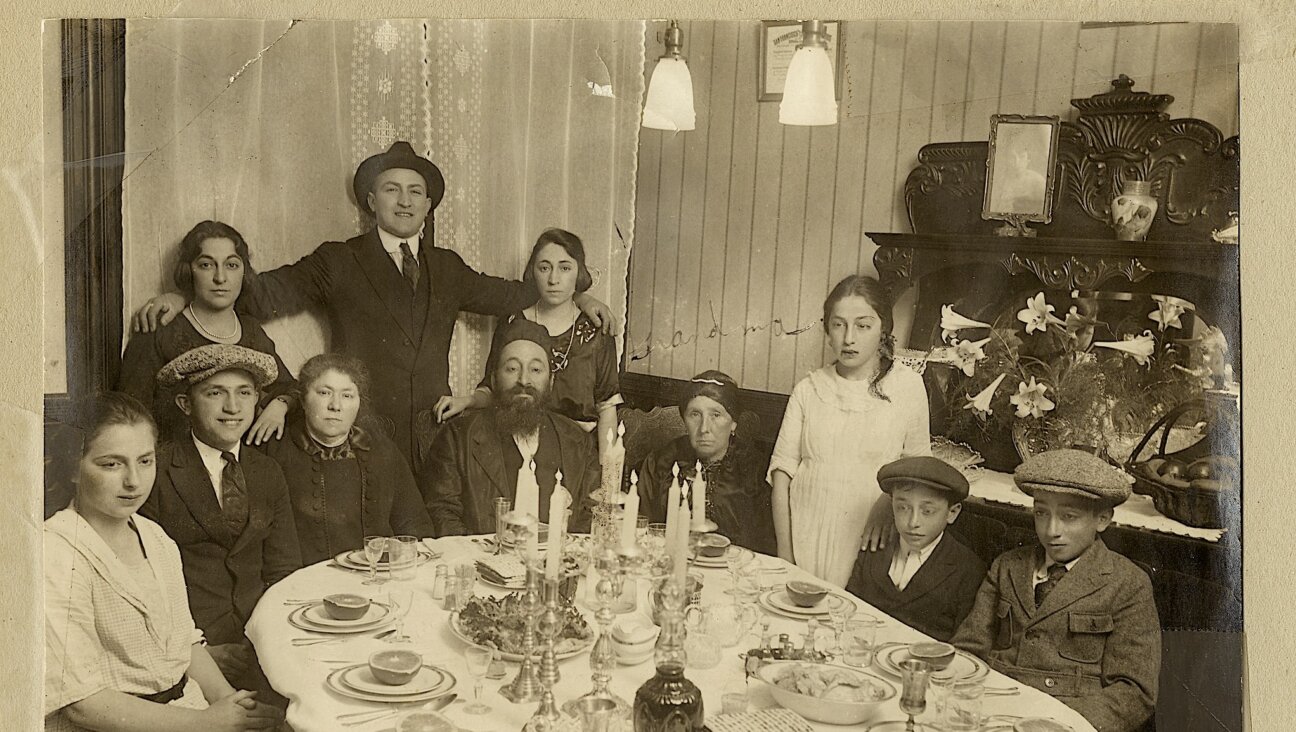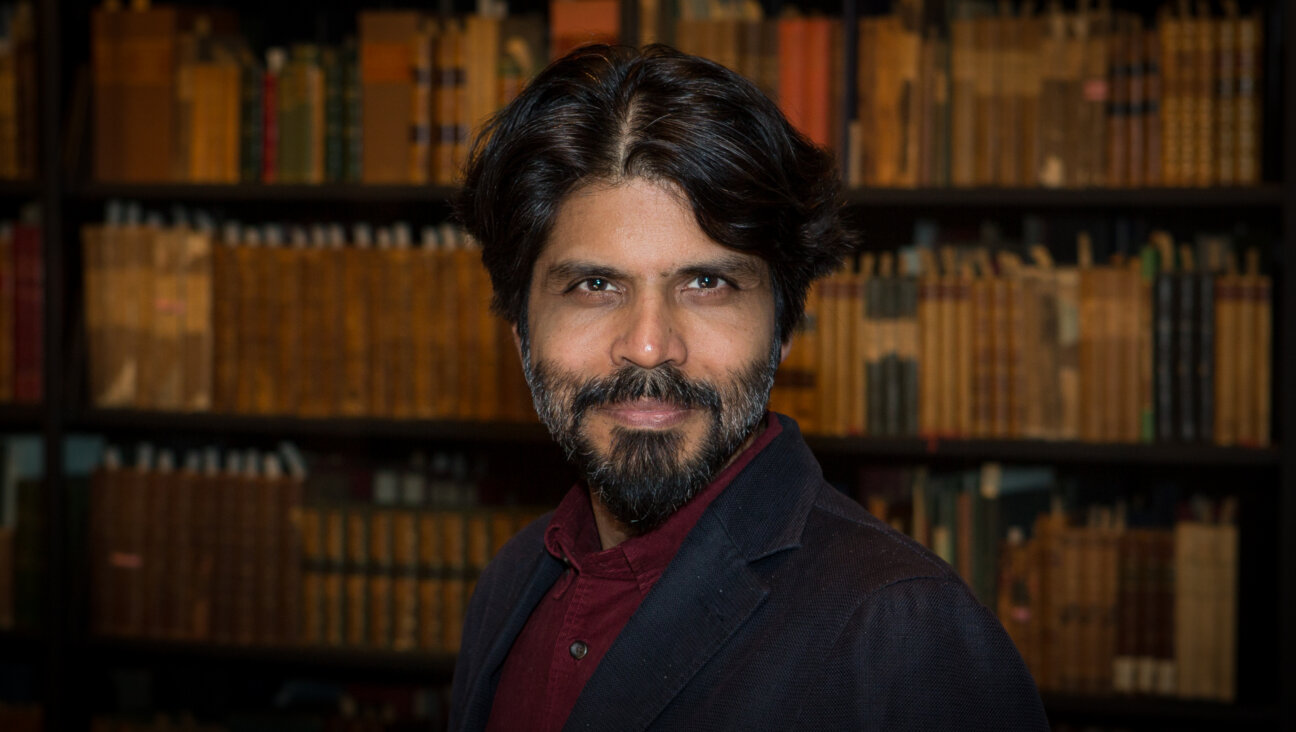The Operator: The Double Life of a Military Strategist

A BYZANTINE STRATEGY: In his latest book, Luttwak will argue that, in crafting its Iraq strategy, America should look to Byzantium.
There’s one thing Edward Luttwak wanted me to know, before he asked if I had a cell phone, and if so, could I turn it off and remove its battery, presumably if improbably so that he couldn’t be traced. We were sitting in his office library in his family’s sprawling Victorian home in suburban Chevy Chase, Md., full of books from floor to ceiling in Greek, Latin and from the modern era, volumes by Clausewitz, Walter Lacquer, Theodore Draper’s account of Iran Contra and thousands of others. These included a recent U.S. Military Balance survey, cataloguing the F-14s, F-7s, Phantoms and every other significant piece of military anti-air equipment estimated to be held by Iran — statistics that Luttwak looked up and ticked off during the course of our interview.

A BYZANTINE STRATEGY: In his latest book, Luttwak will argue that, in crafting its Iraq strategy, America should look to Byzantium.
“I am an operator,” Luttwak said.
Indeed he is, one who carries out field operations, extraditions, arrests, interrogations (never, he insists, using physical violence), military consulting and counterterrorism training for different agencies of the U.S., foreign governments and private interests. When we met, in February, the Drug Enforcement Agency was his latest client; Luttwak says he went to Colombia to help arrest and deliver a couple of Mexican drug runners wanted by the DEA.
Luttwak is of course better known as a public intellectual, the author of some 16 books, as well as a forthcoming study on warfare in Byzantium, set to be published next year by Harvard University Press. “We will never be the Roman empire,” Luttwak said, summarizing his thesis. “Bush, the genius, if he’s lucky, will create a situation as in Byzantium, where the different enemies fight each other.” In fact, his two identities have always been intertwined: On a first name basis with the heads of Italian and other foreign government security agencies, Luttwak performs such quasi paramilitary operations — under the vague title of “consultant” — while maintaining a public image as a military historian, thinker and writer, if a frequently (and deliberately) controversial one.
Why is this 65-year-old intellectual — on the editorial boards of Harper’s, Britain’s Prospect and France’s Geopolitique, an emeritus fellow at the Center for Strategic and International Studies — still in the business of arresting fugitives and interrogating drug dealers, I asked Luttwak. It was evident he didn’t even believe in some of the missions he was doing (the drug war is futile, he howled, a fraud, and the heads of the DEA know it’s a fraud). Is it a thrill? Luttwak admitted, that yes, it’s thrilling. He enjoys the physical thrill of it all.
Born to a wealthy Jewish family in Arad, in Transylvanian Romania, in 1942 during World War II, Luttwak and his family fled soon after to Italy, where his father started one of the first Italian plastics factories. At the age of 9, he was sent off by his family to a Jewish boarding school in London, where he would later attend the London School of Economics. Given his background — part cosmopolitan, part refugee — from all over Europe, it’s no surprise that Luttwak speaks a half dozen languages fluently and with evident pleasure (his phone message at home is in three languages). He still travels frequently to Europe, South America and Asia for his consulting assignments. In addition to their Maryland home, Luttwak and his wife, sculptor Dalya Luttwak, also own an ecologically friendly cattle ranch in Bolivia. (Luttwak, who told me he conducts his family’s Passover Seder in the ancient Aramaic, says he doesn’t consider himself religious, but enjoys the traditions.)
Luttwak’s career as an international defense consultant, military strategist and operator, was launched when, in 1968, as a 26-year-old graduate of the London School of Economics, he wrote what would become his seminal book, “Coup d’etat: A Practical Handbook,” about how countries and groups can both launch a junta and protect themselves from one, and which, Luttwak noted proudly, is still in print some 40 years later. “This short book is…wicked, truthful, and entertaining,” the New Yorker wrote in its review of “Coup,” which has been printed in 14 languages. Recruited to Johns Hopkins after advising the French, Israeli and other governments on military matters, Luttwak earned a PhD in international relations and started consulting for the U.S. Department of Defense, military services, the National Security Council, State Department and nascent U.S. special operations command. Soon he was doing actions for, among others, the undersecretary of defense for policy in El Salvador.
Luttwak first came to my attention by way of an obscure detail in incorporation papers I had retrieved from a government registrar a few years ago, that named him as an officer in a small private consulting company, I.S.I. Enterprises, Inc., headed by Michael Ledeen, the neoconservative historian and writer who had a key role in the Iran Contra affair and who more recently engineered meetings during the Bush administration between Pentagon officials and controversial arms dealer Manucher Ghorbanifar.
Luttwak said that he and Ledeen, both fluent Italian speakers who served as consultants to the Reagan administration, are still friends, but that he left their joint international consulting business soon after it was formed, after completing assignments for the security services of Italy and Spain. (After he left, according to Luttwak, Ledeen went on to do lobbying and consulting through the business in Africa.) Luttwak said that he doesn’t do the kind of more political covert action that his friend Ledeen favors.
“Michael is much more of an adventurer in political action than I was,” Luttwak explained. “I like my adventures in nature.”
Luttwak expounds on his insistence on scrupulously upholding the letter of the law “to the last millimeter” in whatever country in which he is currently operating, mentioning that he once turned down an Iran-Contra assignment in Central America when, on a hunch, he checked with then-House Intelligence Committee minority leader Dick Cheney if the tasking order was indeed authorized by a presidential finding and Congress notified of its existence.According to Luttwak, Cheney called him back after checking and told him no.
Many of these past associations emerged in a recent episode revealed during my meeting with Luttwak: that he was shown the infamous Niger forgeries by a friend with the Italian intelligence agency Sismi, when he was working as a consultant to a Sismi contractor named Luciano Monti in the 2001-2002 time frame, but that he refused to back-channel them to the Bush administration. (He never agrees to back-channel intelligence, Luttwak said, and these looked like forgeries to him.) The allegations in the forgeries, of course, became one of the Bush White House’s most controversial casus belli for the Iraq war — and, after proven phony even on the eve of the invasion, among the most embarrassing and politically damaging for the president and vice president, who cited the bogus uranium allegations despite warnings from the CIA not to.
There are a few public glimpses of intriguing episodes of covert military operations in Luttwak’s past. One was recounted in the book “Charlie Wilson’s War,” by the late Harper’s editor and “60 minutes” producer George Criles, recently made into a movie, which described Luttwak advising Wilson on what non American anti-aircraft weapons the CIA could covertly supply to the Afghan mujahadeen. According to Criles, Luttwak recommended the Swiss Oerlikon. Luttwak mentions his presence in “Charlie Wilson’s War” as being one of the few public descriptions of him — at first glance, a somewhat absurd statement, for the author of more than a dozen published books. But perhaps what Luttwak really means is that “Charlie Wilson’s War” is one of the few public works that reveal his non-academic, operational side.
Another revealing Cold War episode in Luttwak’s more covert professional history, recounted by Penn State University criminal justice professor Alan Block in an academic text, describes Luttwak working as an arms consultant and CIA go-between for an unusual client: a right-wing operative, Miami radio talk show host and former beauty queen Barbara Studley, president of an outfit called GeoMiliTech Consultants Corporation, whose Cold War-era arms sales involving Iran, South Korea, Israel and Central America foreshadowed the Iran Contra operation. According to Block, “GeoMiliTech presented [then CIA director] Bill Casey its ultimate plan — a coordinated series of weapons deals worth $80 million, many of them barter arrangements with Israel, all of them worked through a secret Swiss bank, the whole package guaranteed to evade the ‘consent or awareness of the Department of State or Congress.’ The program was hand-delivered to Casey by Edward N. Luttwak, now a distinguished author and Senior Fellow at the Center for Strategic & International Studies in Washington.”
When, prompted by the trinkets from the South Korean government circa 1980 and 1981 decorating his book shelf, I asked Luttwak about Studley, he at first said he did not recall who that is — using the classic phrasing a lawyer might prompt a client to use in testimony to evade answering untruthfully while not really answering. When I asked him if he knew another of the arms dealers involved in the early Iran arms sales, Arif Durrani, he said far more definitively, “Absolutely not.”
But some 25 years later, covert Iran intrigues and operations were again on Luttwak’s mind when he spoke with me this year. Speaking at a panel held at the Hudson Institute, a Washington think tank, in February, Luttwak hinted at post-Revolutionary travels in Iran. “I recommend that you take a trip to Iran,” Luttwak mischievously suggested to audience members. “Isfahan is beautiful, as is Tabriz in the north, where the people crave to be Turks,” he said, before describing being offered whiskey — the good stuff — by locals he met, a sign of their defiance to the mullahs.
Luttwak told me he had traveled to Turkey on a prospective assignment a couple years ago that involved advising Azeri Iranians how they might agitate for more independence from the Tehran regime. He walked away from the assignment, he described, when it became evident to him that the operation was not, as he had originally thought, authorized by the necessary governments.
But in April, Luttwak told me, he was off to Paris to meet with another Iranian group seeking his consulting services. “My client is an anti-Iran group,” Luttwak said. “They are serious enough to have come up with funds to hire consultants.” He wouldn’t reveal which group it was, except to say it was authorized to operate in France.
Luttwak has said in numerous interviews and public appearances that he believes someone should act to destabilize the Iranian regime by arming and supporting its various disgruntled ethnic minority groups — the Kurds, the Goranis (“who are Kurds but don’t know it,” he told the Hudson audience), Azeris (who consider themselves Turks, Luttwak said), Baluch, Khuzestanis — to rise up against the against the Tehran regime. Iran is the last multinational country in the region, Luttwak told the Hudson Institute, and its fate, like other multinational empires, is to break up.
Iran is also central to Luttwak’s thinking about America’s own political landscape and the current presidential race. When we met in February, a day after Maryland’s Democratic primary, Luttwak said that he was supporting Hillary Clinton because he thought she would be most inclined to order air strikes on Iran. Contrary to conventional wisdom, as always, Luttwak said that direct conversations he had had with a certain leading Republican presidential candidate convinced him that this person, under the influence of war-weary Pentagon brass, would be disinclined to order such military action. As for his opinion about presumptive Democratic presidential nominee Barack Obama, Luttwak took a preemptive swipe at the candidate’s elite American supporters who might be under the delusion, according to Luttwak, that Obama would improve America’s image in the world, arguing in a May 13 New York Times op-ed the exact opposite: that the Muslim world would see Obama as a heretic. The Times’s public editor devoted his entire June 1 column to debunking the allegations Luttwak cited in the piece and criticizing the Times’s editors’ decision to run it.
Among the trinkets crowding his library shelves — awards and mementoes from the foreign governments he had advised on coups and counter-coups and terrorism and military strategy — stands a small black and white photo of a young Luttwak, in short pants, a white shirt and suspenders, with his two brothers similarly dressed, the boys from about 6 to 9 years old, his dark-haired mother and father and another man in the style of the late 1940s Europe. I picked up the photo, melded into a metal frame, and asked Luttwak about it. The photo was of his family in Palermo Italy, he said, not at all wistfully, those are his brothers, one now lives in Israel, the other in Nigeria. The darker man with his parents: his “father’s sidekick,” Luttwak said. He looked to be about 8 years old, and World War II was just a few years behind.
Upon my earlier visit, I noticed a gorgeous Ottoman wall hanging in the foyer, and he told me it was from his family’s home in Romania, and how he’d gone, armed, during the height of the Cold War to the family then living in his old family’s home, and told them there would be no problems if they allowed him to go retrieve something that belongs to him, stored under the stairs when his family fled. They let him in, and, he says, he took it.
Before Luttwak asked me to take the cell phone battery out of my phone in our February meeting, I offered him another theory about himself, given his experience as a refugee from the Nazis and the Communists, who taught himself to be not only smarter than his many enemies but constantly tested and prepared for military battle, a one-man intelligence agency and Pentagon, only more single-minded and ruthlessly efficient when necessary: that he is a Jewish survivalist, albeit one with a PhD, a dozen published books, as many languages, and a highly evolved if eccentric sense of personal morality.
He pondered this, and said he doesn’t recognize himself in that description. “I value Jewish culture and traditions, my parents did too, but I am not a believer.” What is there not to believe in, I asked. Luttwak doesn’t believe in a transcendental force, he said, sounding perhaps a rare note of uncertainty. All these human events, the warfare and survival he has written so much about, it seems, are left only to man.
Laura Rozen reports from Washington, D.C., as national security correspondent for Mother Jones. She contributed the afterword to the memoir of former CIA official Valerie Plame Wilson, “Fair Game: My Life as a Spy, My Betrayal by the White House” (Simon & Schuster, 2007).
The Forward is free to read, but it isn’t free to produce

I hope you appreciated this article. Before you go, I’d like to ask you to please support the Forward.
At a time when other newsrooms are closing or cutting back, the Forward has removed its paywall and invested additional resources to report on the ground from Israel and around the U.S. on the impact of the war, rising antisemitism and polarized discourse.
Readers like you make it all possible. We’ve started our Passover Fundraising Drive, and we need 1,800 readers like you to step up to support the Forward by April 21. Members of the Forward board are even matching the first 1,000 gifts, up to $70,000.
This is a great time to support independent Jewish journalism, because every dollar goes twice as far.
— Rachel Fishman Feddersen, Publisher and CEO
2X match on all Passover gifts!
Most Popular
- 1

Film & TV What Gal Gadot has said about the Israeli-Palestinian conflict
- 2

News A Jewish Republican and Muslim Democrat are suddenly in a tight race for a special seat in Congress
- 3

Culture How two Jewish names — Kohen and Mira — are dividing red and blue states
- 4

Opinion Is this new documentary giving voice to American Jewish anguish — or simply stoking fear?
In Case You Missed It
-

Fast Forward Trump’s plan to enlist Elon Musk began at Lubavitcher Rebbe’s grave
-

Film & TV In this Jewish family, everybody needs therapy — especially the therapists themselves
-

Fast Forward Katrina Armstrong steps down as Columbia president after White House pressure over antisemitism
-

Yiddish אַ בליק צוריק אויף די פֿאָרווערטס־רעקלאַמעס פֿאַר פּסח A look back at the Forward ads for Passover products
קאָקאַ־קאָלאַ“, „מאַקסוועל האַוז“ און אַנדערע גרויסע פֿירמעס האָבן דעמאָלט רעקלאַמירט אינעם פֿאָרווערטס
-
Shop the Forward Store
100% of profits support our journalism
Republish This Story
Please read before republishing
We’re happy to make this story available to republish for free, unless it originated with JTA, Haaretz or another publication (as indicated on the article) and as long as you follow our guidelines.
You must comply with the following:
- Credit the Forward
- Retain our pixel
- Preserve our canonical link in Google search
- Add a noindex tag in Google search
See our full guidelines for more information, and this guide for detail about canonical URLs.
To republish, copy the HTML by clicking on the yellow button to the right; it includes our tracking pixel, all paragraph styles and hyperlinks, the author byline and credit to the Forward. It does not include images; to avoid copyright violations, you must add them manually, following our guidelines. Please email us at [email protected], subject line “republish,” with any questions or to let us know what stories you’re picking up.













